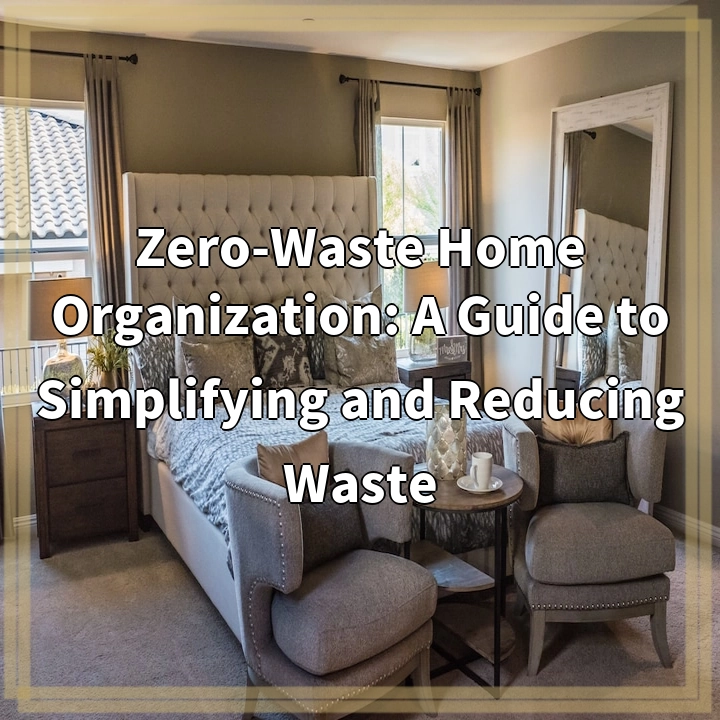
What is Zero-Waste Home Organization?
Zero-Waste Home Organization is a lifestyle and approach to living that aims to minimize waste and reduce the impact on the environment. It involves adopting practices such as recycling, composting, and reusing, and making conscious choices when purchasing and disposing of items in the home. The goal is to create a sustainable living space where minimal waste is generated, and resources are used efficiently.
The Real-World Problems Associated with Zero-Waste Home Organization
While zero-waste home organization is a commendable practice, it does come with its own set of challenges and problems. Understanding these challenges can help individuals navigate the journey towards a more sustainable lifestyle effectively.
1. Limited Access to Zero-Waste Resources
One of the main obstacles faced by those interested in zero-waste home organization is the limited availability of zero-waste resources in many areas. It can be challenging to find local stores that offer package-free products or bulk options. This forces individuals to rely on packaging that often ends up as waste.
2. High Upfront Costs
Transitioning to a zero-waste home often requires investing in reusable alternatives and sustainable products. While these investments can save money in the long run, the initial costs may be prohibitive for some households. Sustainable options such as stainless steel food containers or organic cleaning supplies can come with a higher price tag compared to their conventional counterparts.
3. Social Stigma and Limited Awareness
Adopting a zero-waste lifestyle can sometimes lead to social stigma or resistance from friends, family, or colleagues. There may be a lack of understanding or awareness regarding the importance and benefits of reducing waste. Overcoming societal norms and promoting education and awareness about zero-waste living can alleviate this problem.
4. Time and Effort
Achieving a zero-waste home requires dedication, time, and effort. It involves mindful shopping, meal planning, composting, recycling, and finding creative ways to repurpose items. This can be overwhelming for individuals with busy schedules or limited resources, making it challenging to sustain a zero-waste lifestyle in the long term.
By acknowledging these real-world problems associated with zero-waste home organization, individuals can find ways to overcome these challenges and make sustainable changes that align with their lifestyles and capabilities. Taking small steps, such as reducing single-use plastics and adopting reusable alternatives, can still make a significant impact in the journey towards a zero-waste home.

Solutions to the Problems Associated with Zero-Waste Home Organization
While there may be challenges in adopting a zero-waste home organization approach, there are solutions that can help individuals overcome these obstacles and make progress towards a more sustainable lifestyle.
1. Seek Out Zero-Waste Resources
Research and explore options for zero-waste shopping in your area. Look for stores that offer package-free products, bulk bins, or refill stations. Additionally, consider joining online zero-waste communities or attending local sustainability events to connect with like-minded individuals and learn from their experiences and recommendations.
2. Start Small
Transitioning to a zero-waste home doesn’t have to happen overnight. Start by focusing on one area or room of your home and gradually make changes. Begin with simple swaps like using reusable grocery bags, water bottles, or napkins. As you become more comfortable, you can expand your efforts to other areas, such as the kitchen, bathroom, or cleaning supplies.
3. Educate and Raise Awareness
Share your zero-waste journey with others and educate them about the importance of reducing waste. Talk about the environmental and health benefits and inspire them to make small changes in their own lives. By raising awareness, you can help create a supportive community and encourage others to join the movement towards zero waste.
4. Optimize Time and Convenience
Finding time for zero-waste practices can be challenging, but it’s possible to incorporate them into your routine. Meal planning can save time and reduce food waste, and setting aside dedicated time for composting and recycling can help streamline the process. Look for local composting services or community gardens that can support your efforts and make waste management more convenient.
Remember, the journey to a zero-waste home is unique for everyone. It’s important to find solutions that work for your lifestyle and capabilities. By taking small, achievable steps and gradually implementing changes, you can make a positive impact on the environment and inspire others to embark on their own zero-waste journeys.















